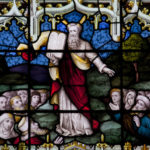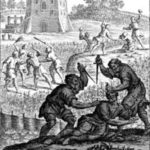We run our website the way we wished the whole internet worked: we provide high quality original content with no ads. We are funded solely by your direct support. Please consider supporting this project.

The Entire Old Testament is About Jesus
Jesus himself taught that he carried more authority than any prophet that predated him. Though Jesus regarded John as the greatest prophet up to himself (Matt 11:11), he claimed his own “testimony” was “weightier (megas) than that of John” (Jn. 5:36). Jesus certainly wasn’t denying John or any previous true prophet was divinely inspired. But he just as clearly was claiming that his revelatory authority trumped everything leading up to him.
In fact, in this same passage Jesus goes so far as to claim that he is the ultimate subject matter of previous revelations. In the course of confronting the Pharisees, he says: “You study the Scriptures diligently because you think that in them you possess eternal life. These are the very Scriptures that testify about me, yet you refuse to come to me to have life” (5:39-40). For this reason Jesus claimed that Moses would serve as their “accuser,” exposing their unbelief. For, Jesus added, “If you believed Moses, you would believe me, for he wrote about me” (5:45-46, emphasis added).
Jesus made the same point to certain disciples after his resurrection. After chiding them for being “slow to believe all that the prophets” had spoken about him, Jesus explained his death and resurrection by teaching them that “[e]verything” that was written about him in “the Law of Moses, the Prophets and the Psalms” had to be “fulfilled.” And in this way “he opened their minds so they could understand the Scriptures” (Lk 24:25, 44-45). In Jesus’ day, the phrase, “the Law, Prophets and Psalms” was widely used to refer to the whole OT.
So too, when Jesus explains his death and resurrection by associating them to what “must be fulfilled” (vs.44) and to “what is written” (vs. 46), he is alluding to the essence of the entire OT Scriptures, and not merely to a few verses that predicted these things. The same could be argued when Luke says Jesus “explained to them what was said in all the Scriptures concerning himself” (vs.27) and when he concludes that Jesus “opened their minds so they could understand the Scriptures” (vs.45). Throughout the passage, Jesus has the entire OT in view, not just selections from it. Thus we can conclude with Graeme Goldsworthy that “Jesus says the whole Old Testament, not merely a few selected texts, is about him.”[1]
On this basis, Poythress concludes that this “particularly important” passage is intended to teach that “Christ himself indicates that the Old Testament from beginning to end is about himself” and that “[t]he whole of the Old Testament … has as its central message the suffering and resurrection of Christ.”[2] David Dockery also concludes from this passage that “[f]or Jesus, the key to understanding the Old Testament was located in his own life and work, for everything pointed to himself.”[3]
Hence, this passage, as well as the earlier mentioned Johannine passage, force us to conclude that, regardless of how “diligently” one studies the Old Testament, one can’t be said to have arrived at the full, complete interpretation of any passage until they have disclosed how it bears witness to the one who is the ultimate revelation of God. Since Jesus’ testimony is “weightier” than John the Baptist, and therefore “weightier” than all preceding speakers, the revelation that comes through Jesus must never be placed alongside of any others. Rather, all others must be interpreted in light of the revelation that comes through Jesus.
[1] Goldsworthy, Gospel-Centered Hermeneutics, 252.
[2] Poythress, God Centered, 60
[3] D. S. Dockery, Biblical Interpretation Then and Now, 26.
Photo via Visualhunt
Category: General
Tags: Bible Interpretation, Cruciform Theology, Old Testament
Topics: Biblical Interpretation
Related Reading

Who is Responsible for Job’s Suffering?
In the prologue of the Book of Job, the author seems to ascribe the responsibility for Job’s affliction to Yahweh. For instance, Satan challenges God to “stretch out [his] hand and strike everything he has,“ believing that this would incite Job to curse God to his face (1:11). The fact that the Lord responds by…

The Centrality of Christ in Hebrews, Part 1
The intense Christocentricity that the New Testament writers embrace is nowhere more clearly and consistently illustrated than in the book of Hebrews. Throughout this work we find a repeated emphasis on the many ways the revelation given to us in Christ surpasses that of the Old Testament. The author begins by stressing how the revelation…

Did God Give Violent Laws? A Response to Paul Copan (#13)
In his critique of Crucifixion of the Warrior God (CWG) at the Evangelical Theological Society annual meeting in November, Paul Copan takes issue with my contention that the violent dimension of OT laws reflects God accommodating the fallen and culturally conditioned perspectives of his people at this time. In my view, God was stooping to…

Rethinking the Resurrection
As much as every other aspect of Jesus life and ministry, I submit that the resurrection must be understood in light of the cross. This event was not anything like the resuscitation of a random corpse. It was the resurrection of the Incarnate Son of God who had fulfilled the human side of the God-human…

The Violent Vineyard Owner: A Response to Paul Copan (#8)
In my previous post I addressed two of the three parables that Paul Copan argues present God in violent ways. Today I will address the third, which is the parable of a vineyard owner with hostile tenants (Matthew 21:33-41; Luke 20:9-13). This parable differs from the previous two parables. Whereas the previous parables deal with…

Part 4: An Alternative Cross-Centered Approach
Image by Karl Pang via Flickr As I mentioned in Part II of this review, I am deeply appreciative of the fact that Flood grasps the centrality of enemy-loving non-violence in Jesus’ revelation of God. And while many, if not most, of the depictions of Yahweh in the Old Testament are consistent with this revelation, I…
